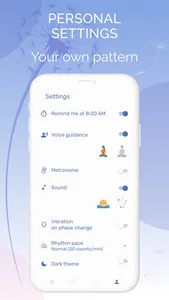The way we breathe determines the way we live.
Relaxed, harmonious breathing signifies health, calmness, a steady pace of life, and high stress resistance.
That's meditation, in which the body breathes in step with the mind.
Our breathing depends on our own state of mind and changes along with it. It can therefore vary between being energetic and elevated when we're excited, frequent and shallow when we're stressed, or free, even, and smooth when we're calm and relaxed.
By controlling our breathing, we can manage our own well-being, calm our emotions, and improve our health.
Deep, relaxed breathing improves the exchange of gases in our lungs, affects the functioning of all internal organs, and reduces stress. We become calmer, more relaxed, and thus more successful.
Our quality of life improves, we have more energy and strength, and our health improves.
In this app you'll find:
- training for how to breathe in a relaxing way;
- rhythms that are suggested by Yantra yoga, the Tibetan yoga of breath;
- statistics of your trainings;
- personal training settings;
- interesting information about breathing.
At the core of the system of rhythmic breathing lies ancient Tibetan knowledge about breathing.
Nowadays, this knowledge can be found in Yantra yoga, a Tibetan yoga of movement. This training is one of Yantra yoga's pranayamas. The precise rhythm and how to properly develop it were described many centuries ago and have survived undistorted to this day.
The training involves following the four phases of breathing: the in-breath, holding one's breath at the end of the in-breath, the out-breath, and holding one's breath without any air (when the lungs are empty).
If you follow these phases in a specific rhythm, your breathing will become peaceful, your mind will relax, and your emotions will become harmonious.
Relaxed, harmonious breathing signifies health, calmness, a steady pace of life, and high stress resistance.
That's meditation, in which the body breathes in step with the mind.
Our breathing depends on our own state of mind and changes along with it. It can therefore vary between being energetic and elevated when we're excited, frequent and shallow when we're stressed, or free, even, and smooth when we're calm and relaxed.
By controlling our breathing, we can manage our own well-being, calm our emotions, and improve our health.
Deep, relaxed breathing improves the exchange of gases in our lungs, affects the functioning of all internal organs, and reduces stress. We become calmer, more relaxed, and thus more successful.
Our quality of life improves, we have more energy and strength, and our health improves.
In this app you'll find:
- training for how to breathe in a relaxing way;
- rhythms that are suggested by Yantra yoga, the Tibetan yoga of breath;
- statistics of your trainings;
- personal training settings;
- interesting information about breathing.
At the core of the system of rhythmic breathing lies ancient Tibetan knowledge about breathing.
Nowadays, this knowledge can be found in Yantra yoga, a Tibetan yoga of movement. This training is one of Yantra yoga's pranayamas. The precise rhythm and how to properly develop it were described many centuries ago and have survived undistorted to this day.
The training involves following the four phases of breathing: the in-breath, holding one's breath at the end of the in-breath, the out-breath, and holding one's breath without any air (when the lungs are empty).
If you follow these phases in a specific rhythm, your breathing will become peaceful, your mind will relax, and your emotions will become harmonious.
Show More






